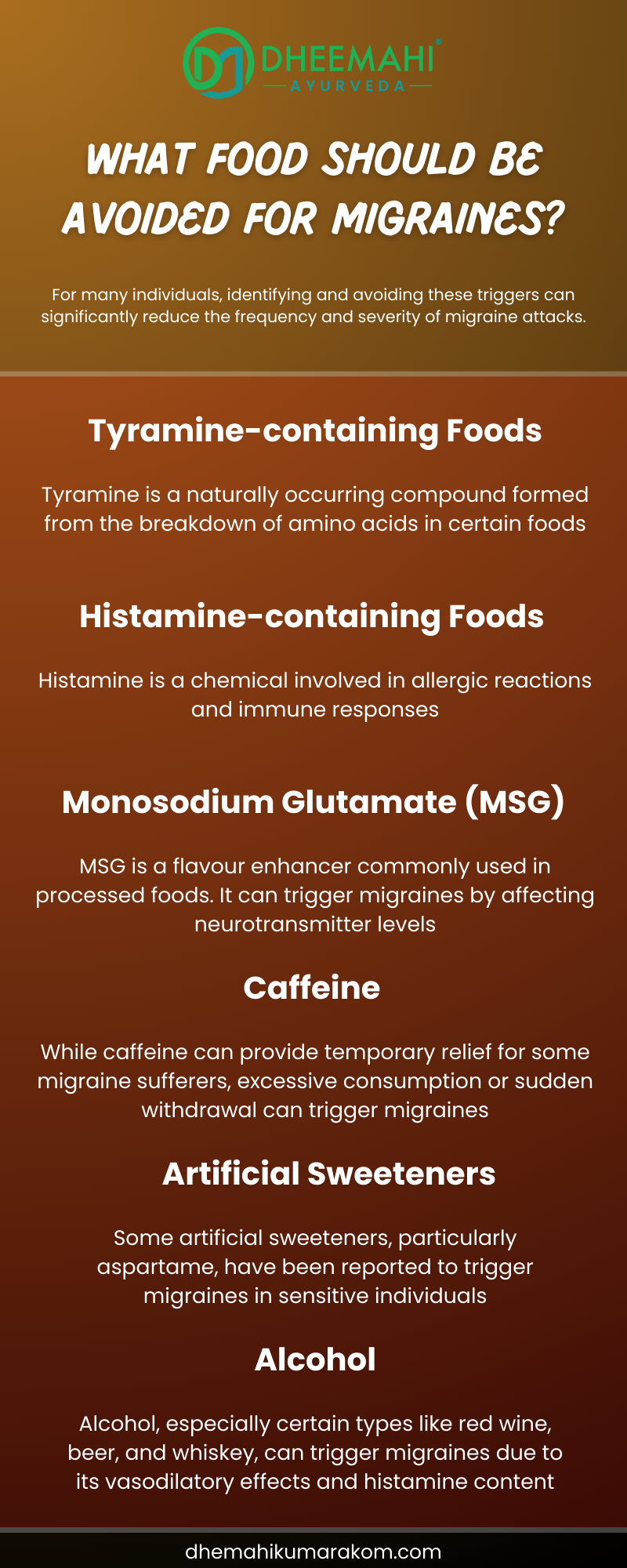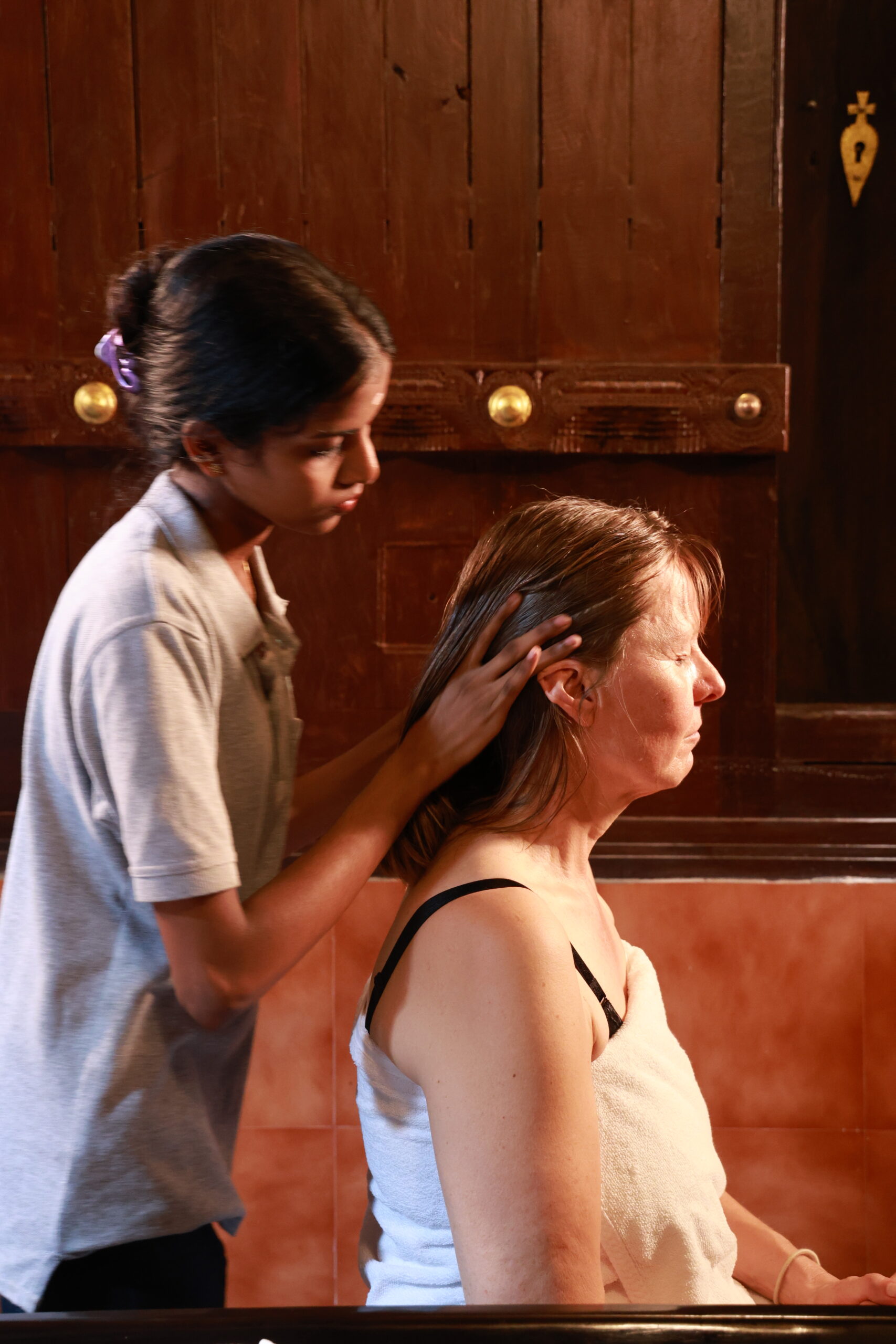What Diet is Best for Migraines?
Dr. Amritha B.A.M.S
Migraine is a neurological disorder characterised by recurring moderate to severe headaches often accompanied by other symptoms such as nausea, vomiting, and sensitivity to light and sound. It affects millions of people worldwide, significantly impacting their quality of life.
Incorporating nutrient-dense foods into your diet while avoiding triggers can significantly reduce the frequency and severity of migraines. Maintaining a balanced diet, staying hydrated, and managing stress is essential.
Best Food to Manage Migraines
Nutrients and Foods Beneficial for Migraine Management
Magnesium-Rich Foods:
Role: Magnesium helps regulate neurotransmitter function and blood vessel constriction, which are believed to play a role in migraine development.
Sources: Include spinach, kale, Swiss chard, almonds, cashews, peanuts, sunflower seeds, whole grains (such as brown rice, quinoa, oats), and legumes (like black beans, lentils).
Riboflavin (Vitamin B2):
Role: Riboflavin contributes to mitochondrial function and energy production in cells, potentially reducing migraine frequency.
Sources: Dairy products (milk, yogurt, cheese), lean meats (chicken, turkey, lean beef), eggs, green leafy vegetables (spinach, broccoli), and whole grains.
Omega-3 Fatty Acids:
Role: These healthy fats possess anti-inflammatory properties, potentially reducing inflammation associated with migraines.
Sources: Fatty fish (salmon, mackerel, sardines), flaxseeds, chia seeds, walnuts, and hemp seeds.
Hydration:
Role: Dehydration is a common trigger for migraines. Adequate hydration is crucial to prevent headaches.
Sources: Water is the best choice for hydration. Herbal teas and infused water can also contribute to fluid intake.
What food should be avoided for migraines?
For many individuals, identifying and avoiding these triggers can significantly reduce the frequency and severity of migraine attacks.
Understanding Migraine Triggers
Tyramine-containing Foods:
Role: Tyramine is a naturally occurring compound formed from the breakdown of amino acids in certain foods. It can trigger migraines by affecting blood vessel constriction.
Foods to Avoid: Aged cheeses (such as blue cheese, cheddar, and Swiss), cured meats (like pepperoni, salami), pickled or fermented foods (such as sauerkraut), and soy products (like soy sauce and tofu).
Histamine-containing Foods:
Role: Histamine is a chemical involved in allergic reactions and immune responses. High levels can trigger migraines in susceptible individuals.
Foods to Avoid: Fermented foods (such as aged cheese, sauerkraut), processed meats (like bacon, sausage), alcoholic beverages (especially red wine), and certain fish (such as tuna, mackerel).
Monosodium Glutamate (MSG):
Role: MSG is a flavour enhancer commonly used in processed foods. It can trigger migraines by affecting neurotransmitter levels.
Foods to Avoid: Processed and packaged foods (like canned soups, chips, and snacks), Chinese food (often contains MSG), and some restaurant-prepared dishes.
Caffeine:
Role: While caffeine can provide temporary relief for some migraine sufferers, excessive consumption or sudden withdrawal can trigger migraines.
Foods to Moderate: Coffee, tea, energy drinks, and chocolate. It’s advisable to monitor caffeine intake and avoid sudden changes.
Artificial Sweeteners:
Role: Some artificial sweeteners, particularly aspartame, have been reported to trigger migraines in sensitive individuals.
Foods to Avoid: Diet sodas, sugar-free gum, and processed foods labelled “sugar-free” or “diet.”
Alcohol:
Role: Alcohol, especially certain types like red wine, beer, and whiskey, can trigger migraines due to its vasodilatory effects and histamine content.
Foods to Avoid: Red wine, beer, champagne, and spirits with high histamine content.
Ayurvedic Migraine Treatment
Ayurveda migraine treatment in kerala emphasizes personalized care based on individual constitution, symptoms, and triggers. It integrates dietary adjustments, herbal remedies, treatments, and lifestyle practices to restore balance and alleviate symptoms holistically.
Identification of Dosha Imbalances
Consultation: A qualified Ayurvedic practitioner assesses the individual’s constitution (Prakriti) and current imbalances (Vikriti) through detailed examination.
Triggers: Understanding personal triggers such as specific foods, environmental factors, and emotional stressors that provoke migraines.
Dietary Modifications
Pitta-Pacifying Diet: Focuses on cooling, soothing foods to balance Pitta dosha and reduce inflammation.
Foods to Include: Sweet fruits (like sweet apples and pears), leafy greens (spinach, kale), cooling vegetables (cucumber, zucchini), basmati rice, mung beans, and ghee (clarified butter).
Foods to Avoid: Spicy and sour foods, hot peppers, caffeine, alcohol, processed foods, and excessively salty foods.
Ayurvedic Therapies
Nasya: Nasal administration of medicated oils alleviates headaches and balances doshas through the nasal passages.
Shirodhara: Continuous pouring of warm herbal oil over the forehead induces deep relaxation, reduces stress, and calms the mind.
Abhyanga: Ayurvedic oil massage improves circulation, relieves muscular tension, and promotes overall relaxation.
Lifestyle Recommendations
Stress Management: Incorporate yoga, pranayama (breathing exercises), and meditation to reduce stress levels and manage migraine triggers.
Sleep Hygiene: Maintain regular sleep patterns and ensure adequate rest to support overall well-being.
Physical Activity: Gentle exercises like walking, swimming, and specific yoga postures (asanas) can improve circulation and promote relaxation.
Mind-Body Practices:
Meditation: Cultivate mindfulness and relaxation techniques to reduce stress and prevent migraine attacks.
Yoga: Specific yoga postures and breathing exercises can help balance doshas and enhance overall health.
Conclusion
Dheemahi Ayurveda takes pride in its team of expert doctors who bring a wealth of knowledge and experience. Grounded in traditional Ayurvedic practices, these experts blend ancient wisdom with modern medical understanding, offering a dynamic and practical approach to patient care.
Recognizing the importance of holistic healthcare, Dheemahi Ayurveda emphasizes the need for regular consultations and follow-up check-ups to provide continuous support.
This allows the doctors to monitor progress and make necessary adjustments to treatment plans as required. Dheemahi Ayurveda goes beyond addressing symptoms by acknowledging the interconnectedness of mental and physical well-being.
The emphasis on the mind’s role in achieving a healthy life reflects a holistic approach to health, where cognitive and emotional balance is considered integral to overall wellness.
The unique strength of Dheemahi Ayurveda lies in its ability to harmonise the knowledge of the past five generations with contemporary healthcare practices. This collaboration results in a comprehensive and dynamic approach to patient care, ensuring that traditional wisdom evolves to meet current needs.
Transparency and accountability are fundamental to Dheemahi Ayurveda’s healthcare process. By documenting treatment schedules, patients gain a clear understanding of their therapeutic journey, fostering trust and confidence in the authenticity and effectiveness of Ayurvedic treatments.
How Our Booking Process Works
The unique approach involves a series of discussion during your initial decision-making process to make sure that we will be able to match your expectations with our treatment.
Based on the discussions with you our team of expert doctors will design the best treatment package personalized for your needs.
01
Consultation Form
Fill out our consultation form, and let us know when will you be available for our doctor to talk to you
02
Discussion with Doctor
Discuss your health condition and expectations with our doctor.
03
Booking Confirmation
Confirm the booking by making a payment of 50% advance.
Consultation Form
Submit this form to initiate a booking with us
Have any queries? We will help you. Talk to us now
Say Goodbye to Health Woes & Hello to Healthy Living
Dheemahi Ayurvedic Pvt Ltd
12/386 Varaputhara Road
Kumarakom, Kerala, India
Pin 686563
Dheemahi Ayurvedic Centre, Near Neelimangalam Bridge, Kumaranaloor, Perumbaikad.P.O, Kottayam, Kerala, India, Pin 686016


